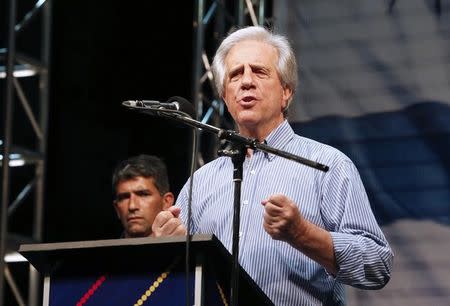Uruguay's presidential election heads to a runoff
By Malena Castaldi and Esteban Farat MONTEVIDEO (Reuters) - Leftist ruling coalition candidate Tabare Vazquez led Uruguay's presidential election on Sunday but he fell short of a first-round victory and will go to a runoff vote next month with the country's pioneering marijuana bill hanging in the balance. Vazquez of the Broad Front coalition said as results trickled in that the race would go to a second round and he is likely to face a nerve-jangling contest against young center-right opposition candidate, Luis Lacalle Pou. Exit polls showed Vazquez winning 44-46 percent of the vote compared with 31-33 percent for Lacalle Pou of the National Party. Official votes came in slowly but, with about 28 percent counted, Vazquez had 42.2 percent support, against 34.7 percent for Lacalle Pou. Pedro Bordaberry of the Colorado Party was expected to win about 14 percent and he quickly endorsed Lacalle Pou, meaning the runoff election on Nov. 30 could be close. Vazquez, 74, first brought the Broad Front to power in 2005. His blend of pro-market economic policies and social welfare measures that slashed poverty rates won broad support but he was constitutionally barred from a second consecutive term. His close ally and now outgoing President Jose Mujica continued the model, which remains popular with many. But others have become disenchanted with the scale of Mujica's social reforms, including the legalization of abortion, gay marriage and marijuana production and distribution. "So we are killing babies now and the state will sell marijuana," said Adriana Herrera, a 68-year-old pensioner. "My frustration is not just with the handout policies but also with the laws that have been approved that are terrible for the country." Lacalle Pou, 41, emerged as a strong candidate after an unexpected victory in his party's primaries, and he campaigned on a platform of change. He told Reuters last week he would try to repeal the state-regulated production and sale of marijuana if he won. CONSERVATIVE ALLIANCE The Colorado Party's Bordaberry was swift to back Lacalle Pou in the second round, saying he had "the best values" of the two contenders. "I will work every hour of the next 34 days to make sure Lacalle Pou wins the runoff," Bordaberry, the son of a former dictator, told his supporters. Uruguay's $55 billion economy has grown an average 5.7 percent annually since 2005. The government forecasts lower growth of 3 percent this year, although that is still better than in neighboring giants Argentina and Brazil. The number of Uruguayans living in poverty has fallen sharply to 11.5 percent from more than a third in 2006. "I want to stick with the Broad Front that ensures success," said Soledad Fernandez, a 27-year old student. "Vazquez and Mujica looked after the vulnerable people." Lacalle Pou's supporters argue it is time for change. They say the surfing enthusiast and father of three is more in touch with Uruguay today than the socialist old-guard and that he brings a fresh face to Uruguayan politics. Vazquez is 74-years-old. While financial markets believe the Broad Front's economic policies are sound, some analysts say Lacalle Pou is more likely to rein in an above-target fiscal deficit and an inflation rate almost in double digits. Voters also elected lawmakers on Sunday. Neither the Broad Front nor the National Party was expected to win a majority in Congress, meaning the next president will face a tougher time than Mujica in passing laws. (Additional reporting by Esteban Farat; Writing by Sarah Marsh and Richard Lough; Editing by Kieran Murray)



